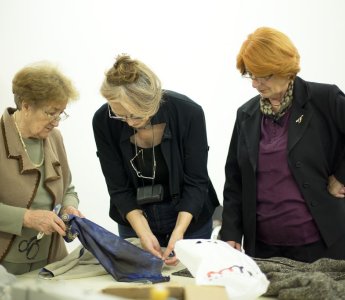At the threshold of Art and Medicine, theSPLICE Project presents a scientific gaze of the human body by showcasing historical anatomical art as both complemented and challenged bycontemporary artworks. The Extensions of Man - Prosthetics - Hacking the Body workshops form an integral part of the SPLICE Projectaiming to investigate changing corporeal perceptions influenced by scientific, social, political and cultural interpretations. The workshop emphasizes physical, cognitive and societal issues of seniors.
DIY prosthetics found its way to a wider audience in parallel with the increased development of 3D printing, Arduino microcontrollers, hands-on electronics, open source hardware and wearable technology in hackerspaces and makerspaces around the globe. Hence nowadays everyone has the opportunity to make in their homes devices that might be pretty much helpful in their lives. Prosthetics, of course, belongs among the serious areas of medicine, science and technology. But what happens when the DIY community joins these fields in order to invent similar things? At this workshop participants will learn how to make their own prosthesis from a simple glove by using Arduino, sensors, electronic circuits and programming and other materialsaffordable by the wider public. In order to make movable parts, participants will learn how an electronic circuit connected with sensors and motors creates a movable object using a micro-controller as a brain. Participation in practical activities such as soldering and connecting wires will in addition present an opportunity to learn the basics of electronics.
Following the introductory lecture by Nina Czegledy, SPLICE project curator, Prof. Ronald Baecker founder of the "Technologies for Aging Gracefully (TAG) Lab” of the University of Toronto presents the project and Erika Biddle-Stavrakos, a PhD candidate, York University, Toronto sharesher personal amputee experience, both on Skype.
Nina Czegledy (CA)
Nina Czegledy, artist, curator, educator, works internationally on collaborative art, science and technology projects. The changing perception of the human body and its environment as well as paradigm shifts in the arts inform her projects. She has exhibited and published widely, won awards for her artwork and has initiated, led and participated in workshops, forums and festivals worldwide.
Her current curatorial project: SPLICE, At the Intersection of Art andMedicinewas exhibited in Vancouver (2012), Toronto, Mississauga (2012), and at Pratt, in New York (2013). She has initiated various thematically linked round tables, performances and workshops, among them a series on Prosthetics. Current collaborative art projects: The Visual Collider touring project, with Marcus Neustetter, South Africa, exhibited in 12 venues in North America, Europe and South Africa, 2010-2012; Galactic Wind, audio-visual collaborative installation SCANZ2013 in New Zealand, Aura, Aurora audio-visualtouring exhibition with Bettina Schuelke, Laszlo Kiss: Machfeld Gallery, Vienna, 2012, artMuse Festival 2011, Plein Air festival, Budapest 2010, Thessaloniki Biennale 2009. Czegledy is a Senior Fellow, KMDI, University of Toronto; Associate Adjunct Professor Concordia University, Montreal; Senior Fellow, Hungarian University of Fine Arts, Budapest; member of the Leonardo/ISAST Governing Board, International Research Fellow Intercreate org, New Zealand, contributing editor to LEA, the Leonardo Electronic Almanac.
Radiona.org / Zagreb Makerspace (HR)
Radiona.org / Zagreb Makerspace - Association for Development of ‘do-it-yourself’ Culture has been founded as an outcome and extension of the I’MM_ Media lab (http://immmedialab.wordpress.com/) core team in order to enhance the visibility of makers’ open source culture and self sustainable production, as well as with an aim of connecting all possible fields of art, science and technology. The objective here is to create new realities of networked and collaborative intermedia and new media practices in line with world trends such as DIY (do-it-yourself) and DIWO (do-it-with-others). Radiona.org focuses its activities on education, research processes, artistic projects, curatorial practices, international and domestic inter-sector collaborations, renewable systems and social awareness-related issues, to name a few.











